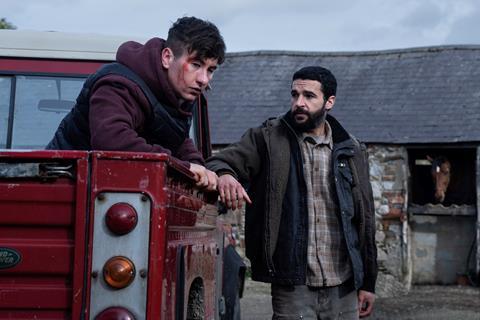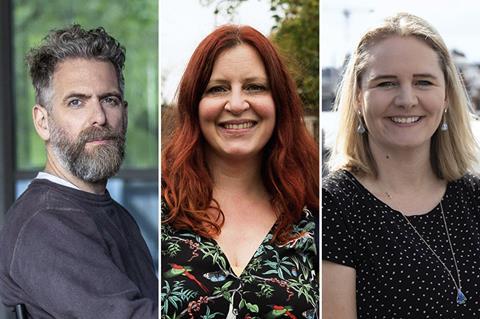Chris Andrews makes his feature debut with the sheep-farming revenge tale

Writer/director Chris Andrews is hoping the momentum behind Irish-language cinema built by box-office and festival success stories The Quiet Girl and Kneecap will roll on with his debut Bring Them Down. The feature world premieres in Toronto’s Special Presentations strand, ahead of playing in competition at the BFI London Film Festival.
The Irish- and English-language rural revenge story is set around Galway in the west of Ireland, as a farmer’s son is drawn into a savage conflict with another shepherding family.
Andrews (a Screen International Star of Tomorrow in 2019) has trodden a different path from the aforementioned films – he did not cast a native Irish speaker, nor even an Irishman, in the leading Irish-language role, opting for US actor Christopher Abbott, star of Poor Things and HBO series Girls, who learned to speak a particularly tricky Galway dialect.
“How exciting that you can have international actors come to Ireland and speak in the Irish language?” says producer Ruth Treacy of Dublin-based Tailored Films. “What does that mean for future Irish films that might have Irish language in them? It opens up whole new opportunities.”
Paul Mescal and Tom Burke were attached to the project in early 2021, but the line-up changed throughout the pandemic-addled development process.
“There is a very small pool of Irish actors of that age who can finance a film, and they’re all massive – Cillian [Murphy], Michael [Fassbender],” says Andrews, who personally suggested looking further afield with Abbott to casting director Julie Harkin. “I just adore Chris in everything he does.”
With Abbott keen, work began to transform him from east coast American to west coast Irishman. Zoom lessons began with Peadar Cox, a dialect coach, a former teacher of U2 frontman Bono and scriptwriter for Irish-language soap Ros Na Rún. Abbott learned his lines phonetically. Cox also worked with Andrews on the script, as Andrews is not an Irish speaker.
To nail the shepherding, Abbott and his Dublin-born co-star Barry Keoghan had just a few hours of training with a shepherd. Both proved to be naturals.
Keoghan’s star was rising when he joined the project. He signed on having shot The Banshees Of Inisherin, but before the film had hit cinemas. On the first day of the January 2023 shoot, Keoghan found out the role had secured him an Oscar nomination, and during the five-week shoot he won the Bafta for best supporting actor.
“We really got on, we had a lot in common as human beings,” says Andrews. “The way we were brought up, in the same kind of economic environment of being under the working class and finding your way up through a system which isn’t geared for you to succeed. It would be harder now [to cast Keoghan]. We’re probably the last film of this size to be able to attract [him].”
The film also stars Colm Meaney, one of Ireland’s most beloved actors. “You never have to buy a drink if you go out with Colm [in Ireland] – everyone buys him so many,” Andrews says with a laugh.
Trading places
Bring Them Down did not start as an Irish project. Andrews is of Irish descent but the former farmhand was born and raised in Cumbria, north England, where he first placed the film.
The idea for the project sprang out of a 2013 news article. “There were spates of rustlers that were going in and cutting the hind legs off sheep in Cumbria and Derbyshire, and they were just letting them bleed out,” recalls Andrews.
He began developing the story with UK producer Jacob Swan Hyam, his collaborator on 2019 short Stalker. Ivana MacKinnon, the UK Wild Swim Films producer behind How To Have Sex, came on board at the first-draft stage of the script, and worked on it with Andrews and Swan Hyam for three years.
A version, Shepherd, made it onto the 2018 Brit List, the annual survey of British film executives’ favourite unproduced screenplays. Funding the film out of the UK alone proved difficult, so MacKinnon looked elsewhere.
“There are always challenges of funding films – it’s the most difficult job in the world,” says MacKinnon. “I certainly feel this with myself and the producers I know, it’s not unconnected to a reaction to Brexit. We’ve all become much keener on looking abroad and saying, ‘Could this be set somewhere else?’”

In 2019, MacKinnon sent the script to Treacy and Julianne Forde at Tailored Films, whose credits include Ali Abbasi’s The Apprentice, the Cannes 2024 premiere about the young Donald Trump’s relationship with controversial lawyer Roy Cohn. They immediately felt the story resonated with an Irish setting. National funder Screen Ireland agreed and offered financing in early 2020.
“These longstanding grudges between neighbours, repressed trauma and inability to communicate in rural communities is huge in Ireland,” explains Treacy. “There are huge stories monthly about neighbours coming to blows over land access. It’s a tale as old as time in Ireland.
“This was the dream project from a co-production perspective, because it was Ireland as Ireland on screen,” she adds. “It wasn’t [just] a financial co-production – it was a creative collaboration.”
A small pot of funding came from the UK Global Screen Fund. Bringing the Irish language into the story unlocked further financing, from Coimisiún na Meán and RTÉ.
Mubi boarded in 2020, around the start of the pandemic. MacKinnon had a meeting with Mubi’s senior vice president of production Bobby Allen, at a time when the VoD platform/distributor was pivoting into production. Allen loved the script, with Mubi initially agreeing to pre-buy territories.
As the film evolved, so did Mubi’s involvement, becoming a central financier. Charades represents sales outside of North America, UK, Ireland, Latin America and Italy, where Mubi retains rights.
The budget of Bring Them Down was sub-€3m ($3.3m), with the shoot taking place in Wicklow on the east coast. Post-production was reserved for Belgium, with Liege-based producer Frakas Productions.
Treacy and Forde used their contacts to cut deals with stunt experts and animal wranglers and keep the ambitious film within its modest budget. Having a crew with lived farming experience (even the costume department had a shepherdess) was also a benefit, although it did not prevent two prize rams from going missing for two days during filming.
Around 90% of the shoot took place outdoors, which for Andrews brought one unexpected disappointment. Most filmmakers would be praying to the weather gods for a forgiving climate when shooting up a mountain in Ireland, in January. But Andrews wanted the opposite to cultivate the film’s morose tone.
“We were pretty blessed with the weather,” he sighs. “I wanted it to rain more.”















![[L-R]: Amanda Villavieja, Laia Casanovas, Yasmina Praderas](https://d1nslcd7m2225b.cloudfront.net/Pictures/274x183/6/4/1/1471641_pxl_20251224_103354743_618426_crop.jpg)




![Kindred Spirits [4] Horizontal Image[9]](https://d1nslcd7m2225b.cloudfront.net/Pictures/100x67/6/9/4/1473694_kindredspirits4horizontalimage9_45584.jpg)




No comments yet